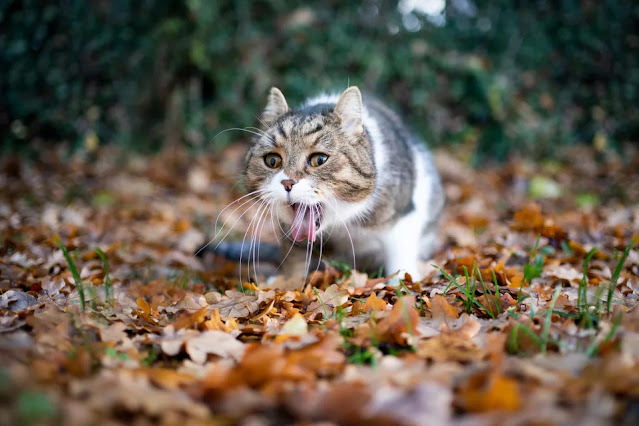Cats can vomit for a variety of reasons. The contents of their vomit can also vary. However, water or clear liquid can signify that a cat is suffering from a serious illness. Vomiting in itself is not a symptom. It can be linked to several health problems. You could have an allergic reaction, internal obstructions or hypothermia. Parasitic infections, liver disease, poisoning, stress or depression are some of the possible causes. But what is causing your cat's vomiting of water or clear liquid?
It can be difficult for a cat to distinguish water from clear liquid. Clear liquid vomit indicates that the cat has ingested fluid from its digestive tract. If your cat vomits clear liquid after drinking large amounts of water, they may be vomiting the same water. If a cat drinks excessive amounts of water too quickly, its stomach will become enlarged and stretched, causing them to vomit water. Increased thirst can be caused by kidney disease, hyperthyroidism or diabetes mellitus.
Possible Causes for Your Cat Vomiting Clear Liquid
Hairballs
Cats are naturally clean and meticulous animals. They groom themselves for most of the day. Your cat's tongue is covered with tiny hook-like structures that catch hair, and then they swallow it. Most hair goes through the digestive system without any problems. However, some hairs remain in the stomach and form a hairball.
A clear liquid is usually what cats vomit before getting a hairball. While occasionally a cat may vomit up clear liquid before a hairball, this is not something to worry surrounding. However, your cat mustn't have to go through hairballs often, painlessly, or make it difficult to pass them. Some over-the-counter dietary supplements can be used to prevent hairballs from your cat. These supplements come in gel or chew form. Regular brushing and getting your cat used to brush can help eliminate any fur that your cat may have ingested while grooming.
Food and Dietary Changes
If your cat is not eating as usual or misses a meal, it may vomit clear liquid.
You may also have changed your cat's diet too fast. It is best to gradually change your cat's diet over five to seven days. This will allow you to gradually decrease the amount of cat food and increase cat food.
Clear vomit can be caused by cats who eat too fast. Your cat may vomit partially-digested or unabsorbed food if they are a scarf and band cat. After confirming that your cat is not vomiting up food, your vet may recommend you try a commercial food for sensitive cats. Your vet may recommend that your cat be placed on a hydrolyzed protein diet if your cat continues to vomit.
Your veterinarian may suggest food puzzles to your cat. Your cat will enjoy food puzzles as a source of enrichment and play. You can find more food puzzles on the market to stimulate your cat's foraging and predatory instincts. Food puzzles are great for cats who tend to vomit their food often. They slow down the time it takes to eat, not to eat too fast and get sick.
Indigestion
Like humans, cats produce different gastric juices to help them digest their food. Cats may vomit if they skip a meal or eat too much. Indigestion is a condition in which cats vomit clear liquids, yellow foam, and white foam. Your vet may recommend that you give your cat small, frequent meals throughout each day to help reduce any stomach acid buildup.
Gastritis
Your cat may be prone to eating things they shouldn't. They may have accidentally irritated your stomach by eating something they ate. You may notice vomiting, blood, or bile, as well as a clear liquid. A decrease in appetite, depression, lethargy, and dehydration may be signs of a cat's illness. Your veterinarian will be able to tell you what to do if your cat starts vomiting from gastritis.
Some other causes can include
· Parasites
· Constipation
· An obstruction of foreign material in the intestinal tract
· Ingesting a toxin
· Metabolic disorders such as diabetes, kidney disease, and hyperthyroidism
What Should I Do if My Cat Is Vomiting Water?
Cat owners might call their cat "puke-y," but that is not the right way to describe it. It should be noted that cats are not prone to frequent vomiting. More vomiting A problem cat visits more than once per week. If your cat is having trouble eating, Clear liquid or water should be thrown away several times and together. Other symptoms include lethargy, weight loss, lack of appetite, and other signs such as Diarrhea is a serious condition that should be treated immediately. You should consult your vet immediately. Your vet will start by performing a physical exam, checking your cat's vital signs, and palpating your cat's abdomen.
After an in-depth examination, Your vet might also request some tests such as blood work. X-rays. A blood test will be done to check the function of your cat's organs. There are no signs of kidney disease or liver disease. An x-ray will check the levels of red blood cells and platelets in your cat. An x-ray scan will show the levels of red blood cells and platelets in your cat. Any fluid found in the abdomen that could be blood should. Also, you may see intestinal gas patterns that could indicate a condition such as a Blockage.
Your veterinarian may recommend that your cat have special needs—hospitalization for fluid therapy or supportive care. You may require outpatient treatment and oral medication to take home. Your doctor may recommend that you seek out treatment for your If your vet suspects that your cat is suffering from an intestinal obstruction, your cat may need to be treated immediately—operation to clear any blockage.

